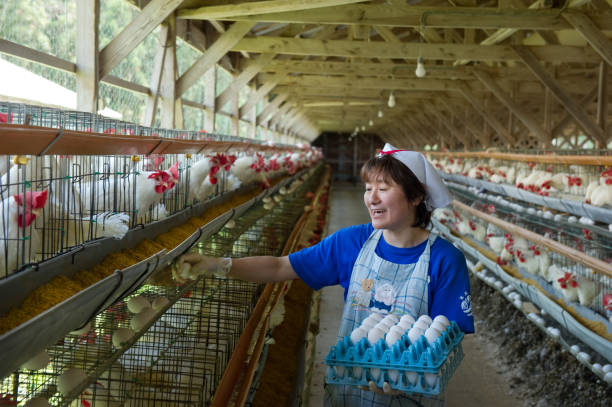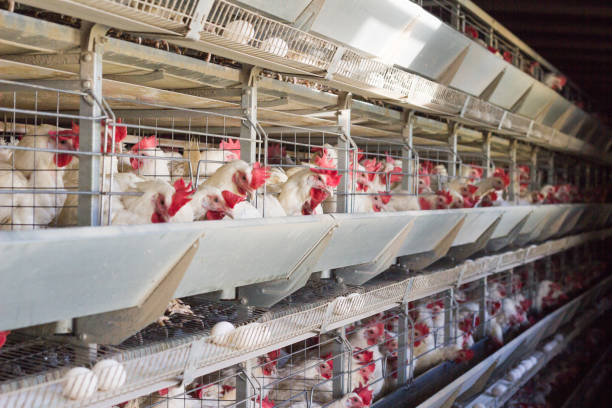How to Write a Business Plan for Poultry
Time : 2024-06-27
A well-crafted business plan is crucial for the success of any poultry farming venture. It provides a roadmap for the business, helps secure funding, and guides day-to-day operations. This guide will walk you through the process of creating a comprehensive business proposal on poultry farming. We will cover the essential components of a good business plan on poultry farming, offer practical tips, and highlight the role of LIVI Poultry Equipment Factory in providing top-quality farming equipment.
Understanding the Importance of a Business Plan
Purpose and Benefits
A business plan serves multiple purposes, including:
- Guiding Business Operations: Provides a clear path for achieving business goals.
- Securing Funding: Essential for attracting investors and securing loans.
- Identifying Risks: Helps identify potential challenges and develop strategies to mitigate them.
- Measuring Progress: Establishes benchmarks for tracking progress and making adjustments as needed.
Components of a Good Business Plan on Poultry Farming
A comprehensive business plan on the establishment of a poultry farm should include the following sections:
- Executive Summary
- Business Description
- Market Analysis
- Organization and Management
- Product Line
- Marketing and Sales Strategy
- Funding Request
- Financial Projections
- Appendix
Step-by-Step Guide to Writing a Business Plan for Poultry Farming
Executive Summary
The executive summary is a brief overview of your business plan. It should include:
- Business Name and Location: Provide the name and location of your poultry farm.
- Business Objectives: Clearly state your business goals and objectives.
- Products and Services: Briefly describe the products (eggs, broilers) and services (consultation, training) you will offer.
- Mission Statement: Outline your business’s mission and vision.
- Funding Requirements: Summarize the funding you need and how it will be used.
Business Description
This section provides detailed information about your poultry farm:
- Business Structure: Describe the legal structure (sole proprietorship, partnership, corporation).
- Ownership: Provide information about the owners and their roles.
- Location and Facilities: Describe the farm’s location, size, and facilities.
- History and Background: Include the history of the business if it’s already established, or the background of the founders if it’s a new venture.

Market Analysis
Conducting thorough market analysis is crucial for understanding the industry and identifying opportunities:
- Industry Overview: Provide an overview of the poultry farming industry, including trends and growth prospects.
- Target Market: Define your target market, including demographics, preferences, and purchasing behavior.
- Competitive Analysis: Analyze your competitors, their strengths and weaknesses, and your competitive advantage.
- Market Needs: Identify the needs of your target market and how your poultry farm will meet those needs.
Organization and Management
Detail the organizational structure and management team:
- Organizational Structure: Provide an organizational chart showing the hierarchy and roles.
- Management Team: Introduce key members of your management team, their qualifications, and experience.
- Human Resources: Outline your staffing plan, including the number of employees, roles, and responsibilities.
Product Line
Describe the products and services your poultry farm will offer:
- Products: Detail the types of poultry products (eggs, broilers) you will produce.
- Production Process: Explain the production process, from hatching to harvesting.
- Equipment: Highlight the equipment you will use, such as chicken cage systems, feeders, and waterers. Mention LIVI Poultry Equipment Factory’s range of affordable and high-quality equipment, including A-type laying hen cages, H-type laying hen cages, H-type broiler cages, and automated auxiliary equipment.
- Quality Control: Describe the measures you will take to ensure product quality.
Marketing and Sales Strategy
Develop a comprehensive marketing and sales strategy to promote your poultry farm:
- Marketing Plan: Outline your marketing strategy, including advertising, promotions, and public relations.
- Sales Strategy: Describe your sales approach, including distribution channels and sales tactics.
- Pricing Strategy: Explain your pricing strategy, considering production costs, market demand, and competitor pricing.
- Customer Service: Detail your customer service policies and how you will build and maintain customer relationships.
Funding Request
If you are seeking funding, this section should include:
- Funding Requirements: Specify the amount of funding you need and how it will be used.
- Funding Sources: Identify potential funding sources, such as loans, grants, and investors.
- Repayment Plan: Provide a detailed repayment plan if you are seeking loans.
Financial Projections
Provide detailed financial projections to demonstrate the viability of your poultry farm:
- Income Statement: Project your revenue, expenses, and net income for the next three to five years.
- Cash Flow Statement: Forecast your cash inflows and outflows to ensure you can meet your financial obligations.
- Balance Sheet: Present your assets, liabilities, and equity.
- Break-Even Analysis: Determine the point at which your poultry farm will become profitable.
Appendix
Include any additional information that supports your business plan:
- Resumes: Provide resumes of key management team members.
- Permits and Licenses: Include copies of any necessary permits and licenses.
- Contracts: Attach copies of any contracts or agreements.
- Market Research Data: Include any relevant market research data.
Practical Tips for Writing a Business Plan on Poultry Farming
Be Realistic
Ensure your financial projections and business goals are realistic and achievable. Overly optimistic estimates can undermine your credibility and hinder your ability to secure funding.
Be Detailed
Provide detailed information in each section of your business plan. The more comprehensive your plan, the better prepared you will be to manage your poultry farm.

Be Clear and Concise
Write clearly and concisely. Avoid jargon and complex language to ensure your business plan is easy to understand.
Seek Professional Advice
Consider seeking advice from professionals, such as accountants, lawyers, and business consultants, to ensure your business plan is thorough and accurate.
The Role of LIVI Poultry Equipment Factory in Poultry Farming
High-Quality Equipment
LIVI Poultry Equipment Factory, established in 1990, has over 30 years of experience in providing high-quality chicken farming equipment. Their products are well-received globally and include:
- A-Type Laying Hen Cages: Suitable for small to medium-scale farms.
- H-Type Laying Hen Cages: Ideal for large-scale commercial farms.
- H-Type Broiler Cages: Designed for raising broilers efficiently.
- Broiler Flat Farming Equipment: Suitable for broiler farms with flat rearing systems.
- Automated Auxiliary Equipment: Includes feeding, watering, and egg collection systems.
Affordable and Durable Solutions
LIVI Poultry Equipment Factory offers affordable prices without compromising on quality. Their durable products ensure long-term use, reducing the need for frequent replacements and lowering overall costs for poultry farmers.
Comprehensive After-Sales Services
LIVI Poultry Equipment Factory provides comprehensive after-sales services, including installation support, maintenance, and technical assistance. This ensures that poultry farmers can maximize the efficiency and productivity of their farms.
Success Stories: Business Proposal on Poultry Farming
Suguna Foods
Suguna Foods is one of the largest poultry enterprises in India, with a significant presence in egg production. Their success is attributed to their integrated farming model, advanced technology, and commitment to quality. Suguna Foods sets a benchmark for other chicken egg layer farms in India.
Venkateshwara Hatcheries
Venkateshwara Hatcheries, popularly known as Venky’s, is a leading name in the Indian poultry industry. They have a comprehensive egg production system, from breeding and hatching to layer farming and egg processing. Venky’s focus on innovation and quality has made them a household name in India.
Skylark Foods
Skylark Foods is a prominent player in the Indian poultry sector, specializing in egg production. Their state-of-the-art facilities, advanced equipment, and stringent biosecurity measures ensure high-quality egg production. Skylark Foods’ commitment to excellence has earned them a strong reputation in the industry.
Alchemist Foods
Alchemist Foods is known for its efficient and sustainable egg production practices. Their modern poultry farms are equipped with advanced technology and equipment, including those from LIVI Poultry Equipment Factory. Alchemist Foods’ focus on sustainability and quality has made them a trusted name in the Indian poultry industry.
Conclusion
Creating a comprehensive business plan is essential for the success of any poultry farming venture. By following the steps outlined in this guide and incorporating the key components of a business proposal on poultry farming, you can develop a robust plan that will guide your business operations, help secure funding, and ensure long-term profitability.
LIVI Poultry Equipment Factory plays a vital role in enhancing the productivity of poultry farms with their high-quality, affordable, and durable equipment. By leveraging their products and services, you can establish a successful poultry farming business that stands the test of time.
Remember, the key to success lies in continuous learning, efficient management, and a commitment to maintaining high standards of hygiene and quality in your poultry farm.











